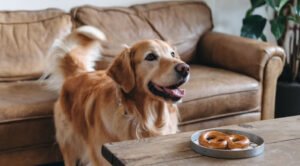Who can forget the iconic Lady and the Tramp scene with two adorable love-struck pups sharing a plate of spaghetti? But was that just all movie fantasy, or can dogs eat pasta? The answer is a tentative yes. Dogs can eat pasta, but there are some important caveats, to keep your furry friend healthy. So, let’s dive into the spaghetti bowl of details.
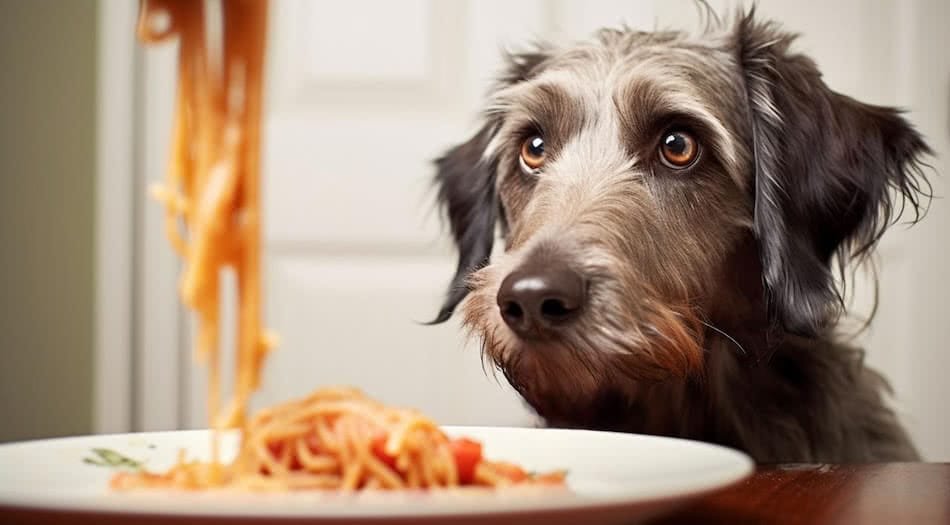
Before introducing any new foods to your dog’s diet, always consult your vet. Individual dogs may have different intolerances, dietary needs, and health considerations. This article is not a substitute for professional veterinary advice.
Is Pasta Good for Dogs?
Plain cooked pasta is generally safe for dogs to eat. However, although it’s not toxic to dogs, pasta lacks any substantial nutrients for your furry friend. It is generally made from flour, eggs, and water. These do contain some nutrients, but they are minimal, and on the whole pasta is mostly empty calories. Carbohydrate dense pasta can give pups an energy boost, but it can also contribute to weight gain if fed in excessive quantities.
Are There Any Health Benefits to Giving My Dog Pasta?
Pasta does not have any significant health benefits for dogs and is not considered a necessary part of their diet. If you choose to give your dog pasta, make sure it is cooked plain and as an occasional treat.
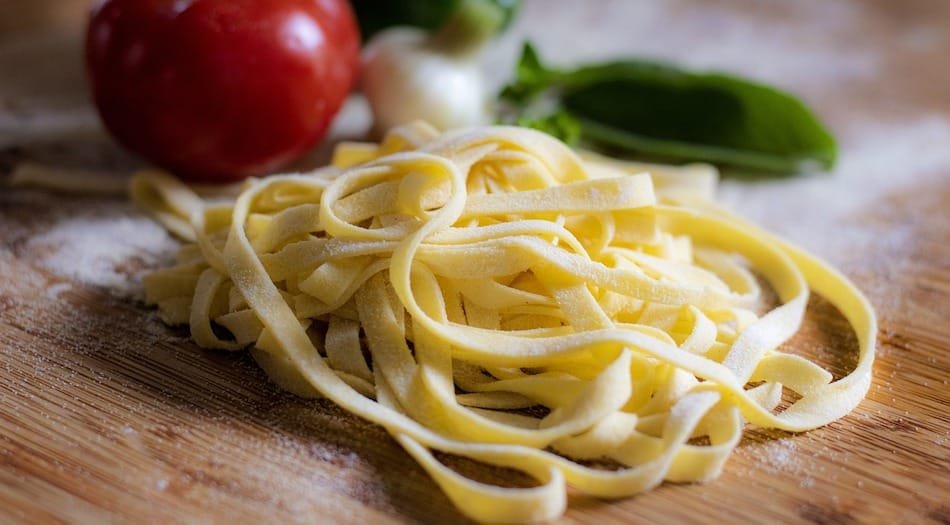
Risks of Feeding Pasta to Dogs?
Feeding pasta to dogs can pose some risks that pet owners should be aware of.
Empty Calories
Pasta does not provide essential nutrients that dogs need. Over-reliance on pasta as a treat can lead to nutrient deficiencies.
High Carbohydrate Content
Pasta is high in carbohydrates, which can lead to weight gain if fed regularly. Excess weight can increase the risk of other health issues, such as diabetes.
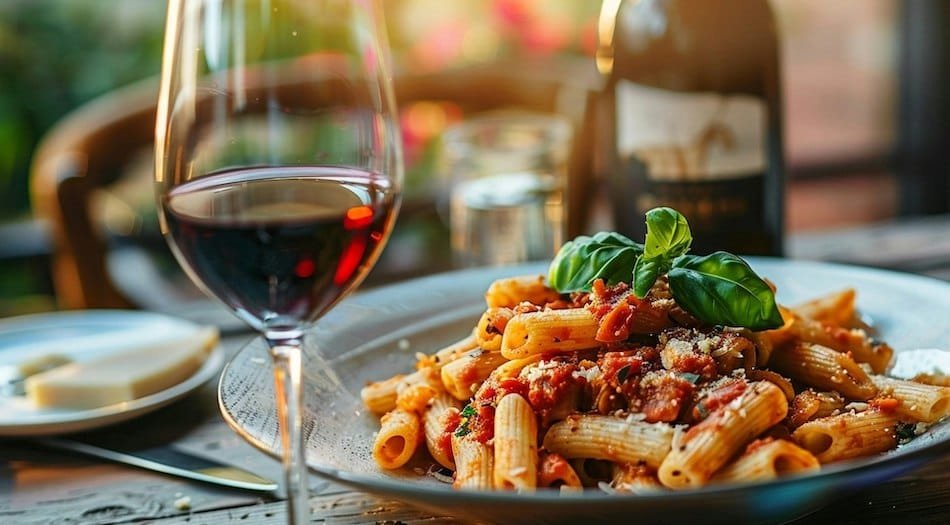
Digestive Issues
Dogs may experience gastrointestinal discomfort from eating pasta, especially if given in large amounts or with unsuitable sauces. Symptoms can include gas, bloating, diarrhea, or more severe reactions.
Allergic Reactions
Some dogs may have sensitivities or allergies to wheat or gluten. This can result in skin issues, vomiting, diarrhea, or more severe allergic reactions.
Additives and Sauces
Sauces and seasonings often served with pasta can be harmful. Ingredients like garlic and onions are toxic to dogs and should be avoided.
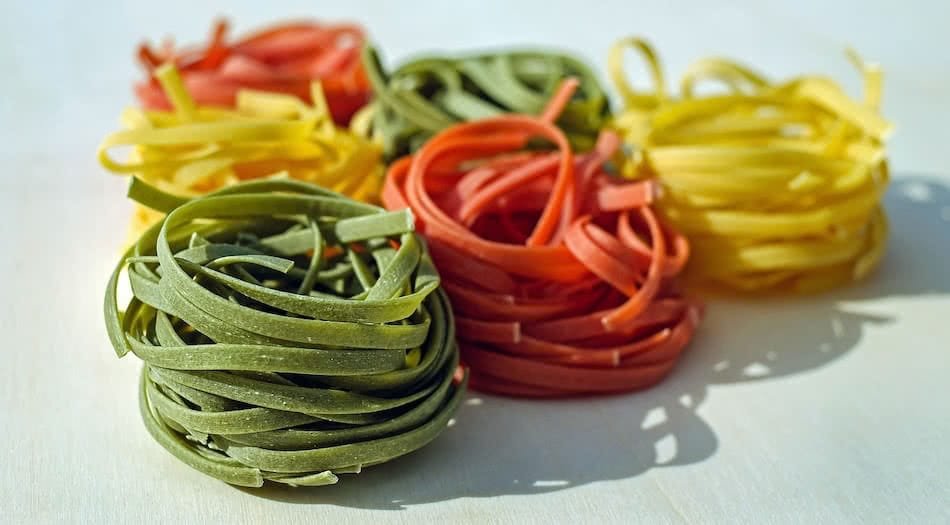
Choking Hazard
Large pieces of pasta can pose a choking risk. Always ensure pasta is cut into manageable sizes before offering it to a dog.
FAQs
Can Dogs Eat Plain Pasta?
Plain, cooked pasta, free from any seasonings is typically safe for dogs to eat. But it’s important to remember that just because it’s safe doesn’t mean it’s necessarily beneficial for your canine buddy. It provides few nutrients, and a lot of carbohydrates which may cause weight gain.
Can Dogs Eat Spaghetti?
Dogs can eat spaghetti provided it is plain and served in moderation. Spaghetti, like other pasta types, can be an enjoyable occasional treat for dogs if prepared without harmful ingredients such as garlic, onion and other flavorings.
Can Dogs Eat Gluten-Free Pasta?
Dogs with wheat sensitivities or intolerance can usually safely enjoy gluten-free pasta. Typically made from ingredients like rice or corn, it can help maintain better digestive health in sensitive canines. However, like wheat pasta, the gluten-free variety does not offer a lot of nutritional value so it should be given only occasionally and in moderation.
Can Dogs Eat Whole Wheat Pasta?
Whole wheat pasta can be a better option for dogs as it contains more nutrients than regular pasta. It provides additional fiber that may benefit their digestive system and more vitamins and minerals, such as B vitamins, magnesium, and iron, which all help your pup’s overall health. It also contains a higher level of protein, making it a more appealing choice for health. However even wholegrain pasta should only be an occasional treat and not a staple for your pup.
My Dog Ate Dry Pasta. What Should I Do?
If your dog ate dry pasta, it is essential to monitor them closely, as eating uncooked pasta can pose a choking hazard. Watch for symptoms such as gagging or coughing, excessive drooling, or difficulty breathing. Consult a vet immediately if you have any concerns. In most cases, if your dog is generally healthy and does not have sensitivities or allergies, if he has consumed a small amount of dry pasta there probably won’t be any serious health issues, but it’s always best to consult with a vet for tailored advice.
Can Dogs Eat Pasta with Cheese?
Dogs can eat pasta with cheese, however both can be problematic. Pasta offers little nutritional value and has the potential to cause weight gain if consumed excessively. Additionally, some pups may be gluten intolerant, causing stomach upsets or worse. Similarly cheese may cause problems for lactose intolerant pets which can lead to digestive upset, vomiting and diarrhea. Cheese is also high in fat which can cause health problems if given in excess. Proper pet care involves ensuring treats are not only enjoyable but also safe. So, it’s important to not only consider each pet’s unique tolerances and sensitivities, but also to only give pasta and cheese in moderation as an occasional treat even in pups without other issues.
Can Dogs Eat Pasta with Meatballs?
Plain, cooked pasta is generally safe for dogs, although it does not offer many nutritional benefits and should only be given in moderation, and not as a staple. However meatballs, which typically contain ingredients like garlic, onions, or excessive seasoning can be toxic to dogs so should be avoided.
Final Thoughts on Can Dogs Eat Pasta?
Most dogs can eat pasta but it should be plain, cooked properly, and be free of sauces, seasonings, and additives that are harmful to dogs. The primary concern is the high carbohydrates and empty calorie content, which can contribute to weight gain if fed in excess, so it should only be given in moderation. Keep in mind too that some dogs might have wheat allergies or grain sensitivities, so always consult your vet for personalised advice before introducing new foods to your precious pup.


